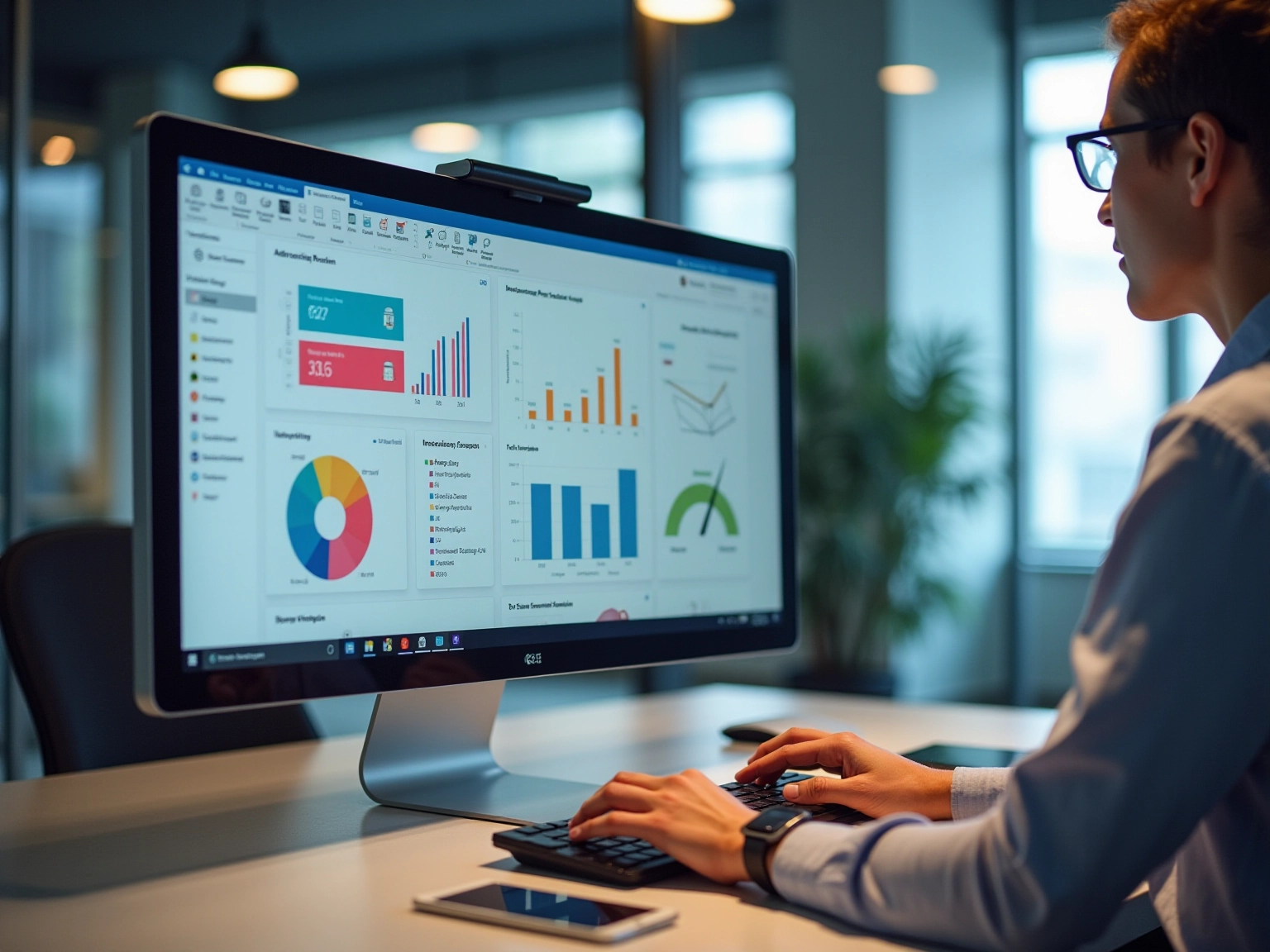Overview
Accounting practise management is a systematic approach to overseeing operations, customer relationships, and workflow processes within financial organisations. This management is essential for enhancing operational efficiency and client engagement. The challenges faced by accounting managers today are significant, often leading to inefficiencies and reduced client satisfaction.
However, utilising robust software like Glasscubes addresses these issues effectively. By automating processes, reducing administrative burdens, and increasing customer satisfaction, firms have experienced notable improvements in response rates and turnaround times. As evidenced by numerous testimonials, the implementation of Glasscubes has transformed operations, allowing firms to focus more on their clients and less on administrative tasks.
The time to act is now—embrace the power of Glasscubes to elevate your accounting practise to new heights.
Key Highlights:
- Accounting practice management is a systematic method for overseeing operations, customer relationships, and workflow processes in financial organizations.
- Key functions include customer onboarding, project coordination, time tracking, billing, and ensuring compliance with regulations.
- Glasscubes enhances customer engagement by streamlining the collection and management of tax and payroll information through secure sharing and real-time collaboration.
- The evolution of accounting practice management has progressed from manual bookkeeping to automated processes enabled by computers and cloud-based software.
- Key features of accounting practice management software include CRM, project management tools, time tracking, billing, and document management.
- Adopting robust accounting practice management software can reduce administrative costs, improve billing accuracy, and increase customer satisfaction.
- Firms using Glasscubes have reported a 40% increase in customer response rates and a 50% reduction in response times.
- Effective practice management enhances operational efficiency and strengthens customer relationships by providing timely updates and personalized service.
Introduction
In the dynamic realm of accounting, firms are increasingly embracing practise management solutions to optimise their operations and enhance client interactions. Accounting practise management involves a spectrum of systematic approaches aimed at streamlining workflows, bolstering client relationships, and ensuring adherence to regulatory standards.
With the emergence of innovative technologies like Glasscubes, traditional methods of managing client information and communication are undergoing a significant transformation. By incorporating features such as secure document sharing and automated reminders, firms can markedly alleviate administrative burdens while providing exceptional client service.
As the industry pivots towards a more efficient and client-centric model, grasping the evolution, key advantages, and significance of effective practise management is essential for accounting professionals striving to excel in a competitive landscape.
Defining Accounting Practice Management
Practise coordination is a vital systematic method employed by financial organisations to effectively oversee their operations, customer relationships, and workflow processes. This encompasses several essential functions, including customer onboarding, project coordination, time tracking, billing, and compliance. The primary objective of accounting practise management in finance is to enhance operational efficiency, improve customer service, and ensure that the organisation adheres to regulatory standards. By integrating technology such as Glasscubes, companies can optimise their processes, reduce administrative burdens, and focus more on delivering value to their customers.
Glasscubes transforms customer engagement by revolutionising how accounting firms collect and manage personal tax and payroll information. Key features, including secure document sharing, real-time collaboration, and automated reminders, significantly enhance response rates and reduce information processing times. This innovative platform addresses common frustrations, such as lengthy email threads and misplaced information, by providing a centralised hub for communication and data organisation.
By adopting Glasscubes, financial firms can markedly improve their efficiency and client satisfaction, ultimately leading to a more effective accounting practise management strategy. Embrace this opportunity to elevate your practise; the future of accounting awaits.

Historical Context and Evolution of Accounting Practice Management
The evolution of accounting practise oversight has a rich history, originating from the early days of manual bookkeeping. As businesses grew and financial transactions became increasingly complex, the demand for structured and efficient organisational systems became evident. The 1980s heralded a pivotal moment with the advent of computers, enabling firms to automate numerous processes. Today, the rise of cloud computing and specialised financial software has transformed accounting practise management, facilitating real-time collaboration, data analysis, and enhanced customer engagement.
Accounting practise management software like Glasscubes integrates various functions into a single platform, streamlining operations and boosting overall efficiency. Glasscubes’ automated communication tools and information-gathering features exemplify how modern solutions can optimise engagement, making it simpler for accountants to connect with clients and effectively manage their needs.
Key Features and Benefits of Accounting Practice Management Software
Key features of accounting practise management are essential for success in today’s competitive landscape. These include:
- Customer relationship management (CRM)
- Project management tools
- Time tracking
- Billing and invoicing capabilities
- Document management
Such features empower companies to optimise workflows, enhance communication with clients, and maintain compliance with regulatory standards. Traditional email communication frequently results in misplaced responses and diminished visibility, ultimately hindering timely service delivery.
The advantages of adopting robust software for accounting practise management are substantial. Companies can significantly reduce administrative costs, enhance accuracy in billing, and elevate customer satisfaction through effective communication. Tools like Glasscubes tackle these challenges head-on by providing automated reminders and real-time reporting, which drastically cuts down the time accountants spend on follow-ups.
With unlimited storage and the capacity to manage customer requests efficiently, accountants can refocus their efforts on higher-value tasks. This shift not only fosters innovation but also enhances customer engagement. Glasscubes operates on a monthly subscription basis, presenting an accessible solution for busy finance professionals eager to streamline their operations and improve service delivery. Why wait? Embrace the future of accounting practise management with Glasscubes today.

The Importance of Accounting Practice Management for Operational Efficiency and Client Engagement
[[Effective accounting practise management supervision](https://tax.thomsonreuters.com/blog/how-ai-is-transforming-tax-and-accounting-firms)](https://tax.thomsonreuters.com/blog/how-ai-is-transforming-tax-and-accounting-firms) is crucial for enhancing operational efficiency and elevating customer engagement. By implementing comprehensive management systems like Glasscubes, firms can streamline workflows, reduce errors, and significantly improve turnaround times for customer requests. This not only boosts productivity but also strengthens customer relationships, as clients benefit from timely updates and personalised service.
For instance, audit manager Steve from MGI states, “Glasscubes has aided significantly so far, enhancing the entire audit process,” which enables quicker responses from customers and increased transparency. Clients appreciate the ability to log in and see exactly what information is outstanding, leading to faster uploads compared to traditional email methods.
Firms utilising Glasscubes have reported a remarkable 40% increase in customer response rates and a 50% reduction in response times, showcasing tangible improvements in service quality. The platform’s features, including automated reminders and connected calendars, enhance coordination among team members and ensure that customer requests are addressed swiftly.
Furthermore, the capability to analyse data and monitor performance metrics empowers firms to make informed strategic decisions, driving growth and profitability in an increasingly competitive landscape. As Steve highlights, “We’ve appreciated having the openness to see everything; we sense that we’re receiving faster replies from customers by requesting information through Glasscubes instead of what we previously did via emails.”
This underscores the value of operational efficiency in the context of accounting practise management.
Discover how we transform customer interactions in just 4 minutes! Watch our on-demand demo to see how we streamline information gathering:
- Get faster, higher-quality responses from clients.
- Avoid workload bottlenecks and delays.
- Save hundreds of hours of effort.
Conclusion
The evolution of accounting practise management has fundamentally reshaped how firms operate, enhancing both efficiency and client engagement. By adopting systematic approaches like those offered by Glasscubes, accounting firms can effectively manage workflows, client relationships, and compliance requirements. This transformation is driven by the integration of advanced technologies that facilitate streamlined processes and improved communication.
Key features of modern practise management software, such as real-time collaboration, secure document sharing, and automated reminders, have proven essential in alleviating administrative burdens. These innovations not only reduce the time spent on follow-ups and information gathering but also significantly boost client satisfaction and response rates. The tangible benefits, including increased productivity and enhanced service quality, underscore the importance of prioritising effective practise management in today’s competitive landscape.
Ultimately, the adoption of comprehensive accounting practise management solutions is not merely a trend; it is a strategic necessity for firms aiming to thrive in an ever-evolving industry. Embracing these tools leads to improved operational efficiency, stronger client relationships, and the ability to make informed decisions that drive growth. As the accounting profession continues to evolve, leveraging such technologies will be crucial for maintaining a competitive edge and delivering exceptional client service.
